| Srl | Item |
| 1 |
ID:
050733
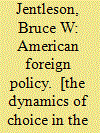

|
|
|
|
|
| Edition |
2nd ed.
|
| Publication |
New York, W.W. Norton, 2004.
|
| Description |
xxvi, 693p.
|
| Standard Number |
0393979342
|
|
|
|
|
|
|
|
|
|
|
|
Copies: C:1/I:0,R:0,Q:0
Circulation
| Accession# | Call# | Current Location | Status | Policy | Location |
| 047784 | 327.73/JEN 047784 | Main | On Shelf | General | |
|
|
|
|
| 2 |
ID:
079570
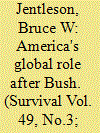

|
|
|
| 3 |
ID:
110154
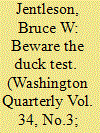

|
|
|
| 4 |
ID:
103247
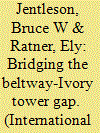

|
|
|
|
|
| Publication |
2011.
|
| Summary/Abstract |
While some gap between the academic and policy worlds is inherent, it is neither necessary nor beneficial for the "Beltway-Ivory Tower" to be as wide as it is. Three principal factors explain the extent of the gap: academia's dominant organizational culture, which devalues policy relevance; increased role of think tanks as research transmission belts to the policy world; and limited interest of the policy community in academic research. The case for the value of greater policy relevance for the international relations scholarly community is based on the intellectual pluralism of bringing policy relevance in while not driving theory out, intellectual complementarity in the different relative strengths of scholars and policy professionals, and self-interest both in what individual scholars can learn and in being true to the mission of universities. We make three principal bridging the gap recommendations: increase disciplinary incentives for policy relevant scholarship, more programmatic and project-based connectivity, and more policy world experiential opportunities.
|
|
|
|
|
|
|
|
|
|
|
|
|
|
|
|
| 5 |
ID:
152740
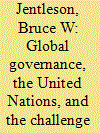

|
|
|
| 6 |
ID:
112939
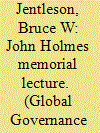

|
|
|
| 7 |
ID:
174618
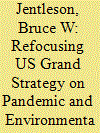

|
|
|
|
|
| Summary/Abstract |
Amidst all the criticisms of the Trump foreign policy, one aspect that has received substantial praise has been the emphasis on great power competition. “After being dismissed as a phenomenon of an earlier century, great power competition returned,” the 2017 National Security Strategy declared. “Long-term strategic competitions with China and Russia are the principal priorities for the [Defense] Department,” the 2018 National Defense Strategy affirmed.
|
|
|
|
|
|
|
|
|
|
|
|
|
|
|
|
| 8 |
ID:
133780
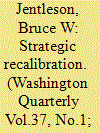

|
|
|
|
|
| Publication |
2014.
|
| Summary/Abstract |
The release of the Obama administration's 2014 National Security Strategy comes amidst increasing criticism of its strategic savvy. Some are rank partisan, some Monday-morning quarterbacking. Some, though, reflect the intensifying debate over the optimal U.S. foreign policy strategy for our contemporary era.
At one end of the debate are those advocating retrenchment, who see limited global threats on one hand and prioritize domestic concerns on the other-be they the budget-cutting of the Tea Party right or the nation-building-at-home of the progressive left. At the other end are neoconservatives and others pushing for re-assertiveness. This is based on a bullish assessment of U.S. power and the contention that it still is both in the U.S. national interest and that of world order for the United States to be the dominant nation. While retrenchment overestimates the extent to which the United States can stand apart, re-assertiveness overestimates the extent to which it can sit atop.
|
|
|
|
|
|
|
|
|
|
|
|
|
|
|
|
| 9 |
ID:
068263
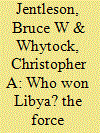

|
|
|